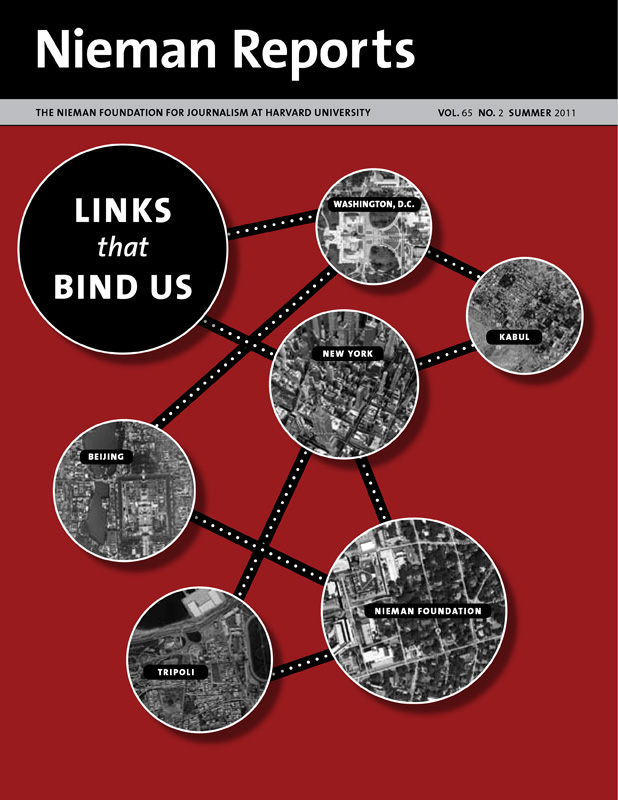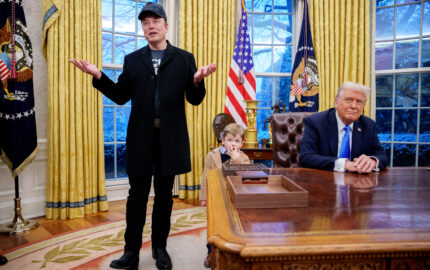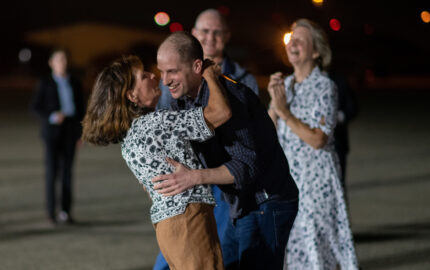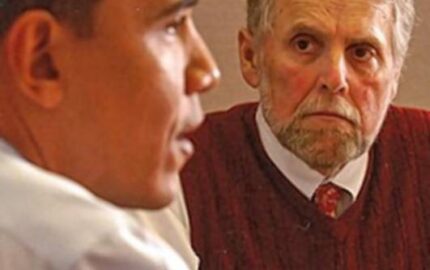
Links that Bind Us
In digital space, journalists are proving to be a powerful force in creating, nurturing and engaging communities. No longer serving only geographic zones, they confront the fragmentation of audience and the need to attract and retain “eyeballs.” Their efforts to embrace and interact with communities are fueled by an instinct to survive. Habits and hobbies, interests and values, political leanings, and sports allegiances are the grist of community formation. Discover the various roles journalists are assuming and how the links we share bind us.
News that Al Jazeera reporter Dorothy Parvaz, NF '09, was in custody, first in Syria and then Iran, introduced an unexpected sense of mission into the Nieman family's ritual of springtime goodbyes. Her captivity without contact inspired the Nieman Foundation to find ways to apply pressure for her release. Spearheaded by her family and classmates, the intense effort to bring Dorothy home involved Niemans throughout the world.
Classmate Rosita Boland, a writer with the Irish Times, described the strategy of the Free Dorothy global campaign to the many Niemans who gathered at Lippmann House for my farewell on a weekend in mid-May and appealed for help. Several gave Rosita ideas and contacts and support. Ellen Tuttle, our communications officer, and I had already written to the Syrian and Iranian governments calling for her release. As we did so, we digitally shared those messages with the entire Nieman family, urging them to do whatever they could to keep attention focused on Dorothy's detainment.
During our festive evening at Lippmann House celebrating my 11 years as curator, I paid tribute to Dorothy and echoed Rosita's plea to join the effort to free her. As I spoke, I could see people's eyes tearing as I described how she had put herself in harm's way to try to report on the crackdown in Syria.
A few days later, on May 18, we awoke to learn the Iranians had released Dorothy. She was in the Al Jazeera newsroom preparing a report on her detainment. Later that day, two Al Jazeera editors wrote to thank the foundation for its "help and care." We may never know what compelled the Iranians to send her home, but it seems fair to suggest that by rallying global attention the Nieman Foundation and Harvard helped to create mounting pressure toward persuading the Iranian government to do the right thing.
Last summer the foundation helped to build a similar coalition of individuals and organizations that convinced the U.S. State Department to issue a visa to Hollman Morris, NF '11, an investigative reporter in Colombia. A visa was denied based on the advice of Colombian intelligence officials who, incorrectly, claimed he was too friendly with the left-wing guerrillas. These many voices backing Hollman led to a full review of the evidence by State Department officials who agreed, finally, that a mistake had been made.
Ann Marie Lipinski, who succeeds me as curator this summer, visited with the Nieman staff on the day of Dorothy's release. She spoke of using the foundation's power and prestige as a global bully pulpit to advocate journalism's highest values and explore its promising models. Helping to free Dorothy and bring Hollman to Harvard demonstrate the effective use of the Nieman bully pulpit.
We welcome Ann Marie's aspiration to expand our global influence as well as build on initiatives that already bring the foundation's voice into critical conversations about journalism. Through Nieman Reports and our other publications, in conferences and the work the fellows will go on to do, the foundation keeps faith with its founding obligation that elevating the standards of journalism will forever be its unfinished business.
Each Nieman program and publication delivers its perspective and content into the flow of conversation about how to address the challenges confronting journalism today. On the morning we met with Ann Marie, the Nieman Journalism Lab launched Encyclo, an online resource with information about companies and organizations that are shaping journalism's rapid, sometimes tumultuous evolution.
As the end of my work at the Nieman Foundation nears, I find myself reflecting on how the experiences and lessons my classmates and I shared in our year (1965-66) at Harvard have remained a vital part of who I am and what I've done in my newspaper career and as curator. So much about how reporters do their work has changed, but what we learned then shaped and influenced journalism's progress and is at the core of its practice today.
In looking back on the ways the foundation has expanded its global reach and influence during the past decade, my core discovery as a fellow is all the more prescient: education is critical and essential for journalists reporting on an increasingly complex and turbulent world. Add to this the dynamics of change reshaping journalism, and this reinforces the essential role the Nieman Foundation will continue to play by providing a stimulating environment where new generations of journalists will learn. When I hear about or see fellows exercising their responsibilities to set a high standard for other journalists to emulate, it is testament to our program's success.
I am deeply indebted to my colleagues at Lippmann House who worked creatively and effectively with me to hold true to the Nieman legacy, which Ann Marie will now watch over. My heart is full of appreciation for the extraordinary privilege of being curator.
Classmate Rosita Boland, a writer with the Irish Times, described the strategy of the Free Dorothy global campaign to the many Niemans who gathered at Lippmann House for my farewell on a weekend in mid-May and appealed for help. Several gave Rosita ideas and contacts and support. Ellen Tuttle, our communications officer, and I had already written to the Syrian and Iranian governments calling for her release. As we did so, we digitally shared those messages with the entire Nieman family, urging them to do whatever they could to keep attention focused on Dorothy's detainment.
During our festive evening at Lippmann House celebrating my 11 years as curator, I paid tribute to Dorothy and echoed Rosita's plea to join the effort to free her. As I spoke, I could see people's eyes tearing as I described how she had put herself in harm's way to try to report on the crackdown in Syria.
A few days later, on May 18, we awoke to learn the Iranians had released Dorothy. She was in the Al Jazeera newsroom preparing a report on her detainment. Later that day, two Al Jazeera editors wrote to thank the foundation for its "help and care." We may never know what compelled the Iranians to send her home, but it seems fair to suggest that by rallying global attention the Nieman Foundation and Harvard helped to create mounting pressure toward persuading the Iranian government to do the right thing.
Last summer the foundation helped to build a similar coalition of individuals and organizations that convinced the U.S. State Department to issue a visa to Hollman Morris, NF '11, an investigative reporter in Colombia. A visa was denied based on the advice of Colombian intelligence officials who, incorrectly, claimed he was too friendly with the left-wing guerrillas. These many voices backing Hollman led to a full review of the evidence by State Department officials who agreed, finally, that a mistake had been made.
Ann Marie Lipinski, who succeeds me as curator this summer, visited with the Nieman staff on the day of Dorothy's release. She spoke of using the foundation's power and prestige as a global bully pulpit to advocate journalism's highest values and explore its promising models. Helping to free Dorothy and bring Hollman to Harvard demonstrate the effective use of the Nieman bully pulpit.
We welcome Ann Marie's aspiration to expand our global influence as well as build on initiatives that already bring the foundation's voice into critical conversations about journalism. Through Nieman Reports and our other publications, in conferences and the work the fellows will go on to do, the foundation keeps faith with its founding obligation that elevating the standards of journalism will forever be its unfinished business.
Each Nieman program and publication delivers its perspective and content into the flow of conversation about how to address the challenges confronting journalism today. On the morning we met with Ann Marie, the Nieman Journalism Lab launched Encyclo, an online resource with information about companies and organizations that are shaping journalism's rapid, sometimes tumultuous evolution.
As the end of my work at the Nieman Foundation nears, I find myself reflecting on how the experiences and lessons my classmates and I shared in our year (1965-66) at Harvard have remained a vital part of who I am and what I've done in my newspaper career and as curator. So much about how reporters do their work has changed, but what we learned then shaped and influenced journalism's progress and is at the core of its practice today.
In looking back on the ways the foundation has expanded its global reach and influence during the past decade, my core discovery as a fellow is all the more prescient: education is critical and essential for journalists reporting on an increasingly complex and turbulent world. Add to this the dynamics of change reshaping journalism, and this reinforces the essential role the Nieman Foundation will continue to play by providing a stimulating environment where new generations of journalists will learn. When I hear about or see fellows exercising their responsibilities to set a high standard for other journalists to emulate, it is testament to our program's success.
I am deeply indebted to my colleagues at Lippmann House who worked creatively and effectively with me to hold true to the Nieman legacy, which Ann Marie will now watch over. My heart is full of appreciation for the extraordinary privilege of being curator.


